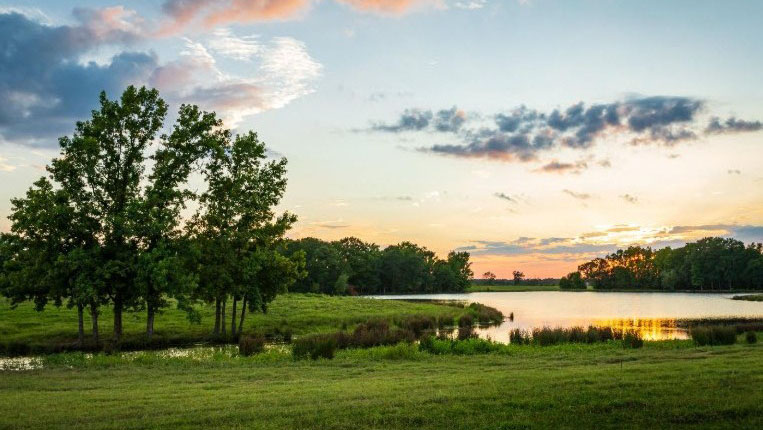8 Key Questions Every Texas Landowner Should Ask
As a Texas landowner, you may have heard the term “conservation easement,”—but what does it really mean, and how could it affect the future of your property? For those who cherish the land they own and want to preserve it for future generations, a conservation easement can be a powerful legal tool. Before making that decision, it’s important to understand what a conservation easement is and whether it’s the right fit for your goals.
At Braun & Gresham, we help landowners navigate the conservation easement process with confidence. Here are answers to eight key questions to help guide your thinking:
1. What Is a Conservation Easement?
A conservation easement is a voluntary legal agreement between a landowner and a third-party “holder,” often a non-profit land trust, that places permanent restrictions on how real property is used in order to protect its open space, ecological, and cultural values. Land encumbered by a conservation easement can still be sold, inherited, or gifted —but certain types of development and uses are limited according to the terms of the agreement. The restrictions may vary for each property based on the landowner’s goals, the unique characteristics of the land, and the conservation goals.
2. Will I Still Own My Land and Control Access?
Yes. There are common misconceptions surrounding conservation easements, suggesting that once you grant a conservation easement (i) the government or the land trust will tell you how to use your property and (ii) you must open your land to the public. These misconceptions are not true. The holder only has the rights agreed to in the conservation easement document. These rights relate to monitoring the property over time to ensure that current and future landowners adhere to the terms of the agreement. The conservation easement does not restrict your rights to use and enjoy the land for agricultural, recreational, and residential purposes. You can continue to live on the land, farm it, hunt on it, and pass it down to your children. Some landowners choose to authorize limited public access for ecological and educational purposes, but many continue to allow only private uses.
3. How Could a Conservation Easement Affect My Property Value or Future Sales?
The conservation easement limits development of the property and will result in some immediate reduction in the market value. The property remains marketable to buyers interested in ranching, farming, having a quiet rural residence, and conservation. In some cases, a conservation easement actually makes the property more attractive to those buyers. Future sales will depend on the demand for protected property.
4. Can I get paid for a conservation easement?
Maybe. Depending on the location and size of your property, there may be funds available to pay you to encumber your property with a conservation easement. Funding sources can be governmental or private grants and are targeted at protecting specific natural resources, such as water or endangered species, or providing buffer land for other public uses. Braun & Gresham attorneys can help you determine if your property is eligible for available funding opportunities.
5. What Tax Benefits Might Be Available?
If your conservation easement meets certain requirements and is donated to a qualified land trust or government agency, you may be able to claim a charitable deduction for the value of the conservation easement on your federal income tax return. For persons with estates large enough to have an estate tax liability, the conservation easement can reduce the value of a major asset and qualify the donor for a supplemental estate tax benefits. These financial incentives can be substantial, especially for high-value properties.
6. What Restrictions Will Be Placed on My Land?
Restrictions vary based on your land and your goals. They will include limits on subdivision, commercial development, and mineral extraction. Conservation easements allow continued agricultural use, including ranching, farming, hunting, and wildlife management. A well-drafted easement provides clear, customized guidelines that reflect your values and vision.
7. Is My Property a Good Fit for a Conservation Easement?
Possibly. This depends on the natural features and location of your land, its current use, and your long-term goals. Conservation easements are commonly used to protect open space, agricultural land, wildlife habitat, water resources, and scenic views. If your land has any of these characteristics and you’re interested in long-term preservation, an easement might be right for you.
8. Who Can Help Me Structure a Conservation Easement?
Conservation easements are legally complex and permanent. That’s why it’s essential to work with an attorney who understands your land, the opportunities for conservation, and the law. At Braun & Gresham, we work with landowners to craft tailored easements that honor your conservation goals while protecting your rights and future options. We also cultivate healthy relationships with appraisers, land trusts, and other real estate professionals necessary to ensure that the process is smooth and advantageous.
Protect What Matters Most
Choosing to place a conservation easement on your land is a meaningful step toward creating a legacy of stewardship. It can also offer financial and emotional peace of mind. If you’re considering this option, we can help you explore whether it’s the right fit. If this tool makes sense for you, we will help you craft a conservation that benefits you and future generations.
Schedule a Consultation
Contact Braun & Gresham to speak with a conservation attorney about your land. We advocate for landowners. While conservation organizations focus on protecting natural resources, we focus on protecting you—your property rights, financial interests, and future plans.
We create customized, strategic solutions. Every landowner’s situation is unique, and we work with you to develop a creative plan that meets your conservation and financial goals while maximizing available benefits.
We ensure you understand your rights. A conservation easement limits development and transfers certain rights to a conservation organization. Before signing, you need a knowledgeable advocate to ensure that you retain the flexibility you desire for your land and your future.
Contact us today to discuss your goals and explore the best options for your land.
Explore More:
- Meet Our Conservation Team
- Conservation Easement Services Overview
Your land. Your legacy. Let us help you protect both.


